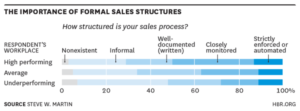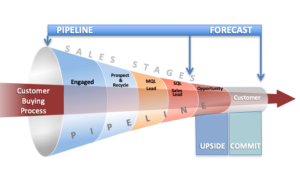8 Best Practices in Managing Sales Performance
Sales managers are uniquely positioned to influence and empower their sales reps. To implement the best practices in managing sales performance, you must prioritize your sales team development.
Key performance indicators (KPI) can tell managers whether sales reps are meeting their goals. It also shows them how each sales rep is performing compared to other sales team members.
This was once a manual process. However, automation and Salesforce technology have made tracking this data nearly effortless. That makes implementing sales performance management best practices for your sales team easier.
This article covers what sales performance management is and the best practices you can execute to ensure the success of your salesforce.
What is Sales Performance Management?
The process of sales performance management ensures that each member of your team is working to achieve the company’s goals and objectives. A robust system can include training, monitoring progress, and developing new skills for professionals.
What are the Best Practices in Managing Sales Performance?
To improve current strategies and work towards achieving better results, implement these best practices:
1. Lead, Don’t Just Manage
Some sales teams are over-managed. Yet, they are under-led. This means that managers depend too much on metrics and deadlines to drive performance. They use those as the only way of achieving goals.
Highly effective sales managers find numerous ways to come alongside team members, motivating them or rewarding them socially.
2. Build Your Team with the Best Talent
Sales managers dedicated to hiring the best talent available have a team that drives up profits for their organization. If you want the best, hire people who already have social goals aligned with your organizational ones.
It costs more upfront, but it pays off over time as they won’t need much training and will be less likely to fail six months down the road. Look for individuals with high levels of motivation. This is what drives excellent performance most often. You can do this by:
- Be clear and set expectations upfront
- Compare accomplishments
- Ask for examples of initiatives they took in the past
- Ask about the recognition they received
- Discuss their self-development
3. Be Consistent with Process Standards
Sales teams are most successful when they have well-defined procedures for each step of the sales process. They use a standardized order to complete their work so that they do not miss any important steps and end up with an excellent product in customers’ hands.
4. Leverage Better Communication
An integral part of a triumphant rhythm is having clear communication on tone and topics. This way, your sales team knows what to aim for. A good manager keeps their expectations well defined from the beginning so their team can work towards it without being confused on how they should perform.
You can set these expectations by:
- Describe what is required to meet sales goals
- Share expectations of work style
- Identify the employee’s needs to maximize performance
- Establish priorities in workload
- Ensure they understand
- Establish a progress check
5. Apply Pipeline and Forecasting Management
A lot of sales managers don’t pay attention to the forecast and instead focus on the pipeline. Forecasts are for late-stage deals, which aren’t as important when it comes to planning future quarters.
The pipeline is more like a plan you make based on what’s going on with a current business that can impact forecasts later down the road. Effective sales managers know the difference, and they use this strategy to train sales staff to think ahead. Not just on the deal at hand, but future deals as well.
6. Maximize Performance of High Producers
A successful sales rep can be a challenge to manage. They are competitive, self-driven, and can be difficult at times. Their high expectations for themselves may make it hard to make them happy.
To motivate and reward these unique sales professionals, managers must take a good one and make them great. Keen managers leverage social networking by using the success of high performers to drive others, leading great individual performers into effective teams.
7. Use a CRM for Your Salesforce
Customer relationship management (CRM) software is a tool for managing leads, contacts, and opportunities as they move through your sales process.
These CRM programs can help you keep track of all the leads that come into contact with your business while also helping to automate the sales cycle.
8. Use Sales Performance Management Software
Sales performance management (SPM) is a collection of software and processes that work together to automate the mundane tasks that take up so much time for salespeople. Using SPM, you can track important information such as progress toward monthly goals and customer relations.
Since its infancy more than two decades ago, SPM software has made unprecedented advancements over the last handful of years – and it only continues to grow in popularity.
The market share for SPM software is projected to reach $3.4 billion in the next five years. This demand is driven by growing automation that makes tracking incentive compensation for sales reps more accurate than ever.
Yet, that is not the only reason to implement this analytical software into your sales performance management best practices. Companies gain valuable insights on customer buying patterns, leads management, and other essential sales metrics.
Implement the Best Practices for Managing Your Sales Team with Rainmaker’s Leading Solutions
Rainmaker’s Salesforce Managed Services offering is a pro-active consulting engagement intended to facilitate our client’s journey towards innovation while maximizing their ROI.
Rainmaker offers CRM implementation and integration services for businesses. They can help you manage sales performance with Salesforce Sales Cloud Add-On products, like:
- CPQ & Billing
- Einstein for Sales Cloud
- High Velocity Sales
- Inbox
- Salesforce Anywhere
- Salesforce Maps
- Lightning Dialer
Many organizations choose Salesforce because it offers various benefits such as ease-of-use and configuration management capabilities allowing businesses to scale their operations.
They can do this without worrying about increasing technical issues or security vulnerabilities. By leveraging our expertise, we make sure that Salesforce is effectively delivering positive business outcomes.
Implementing the best practices for managing sales performance is easier than you think with Rainmaker’s proven solutions. Contact us today to see how we can help you.








